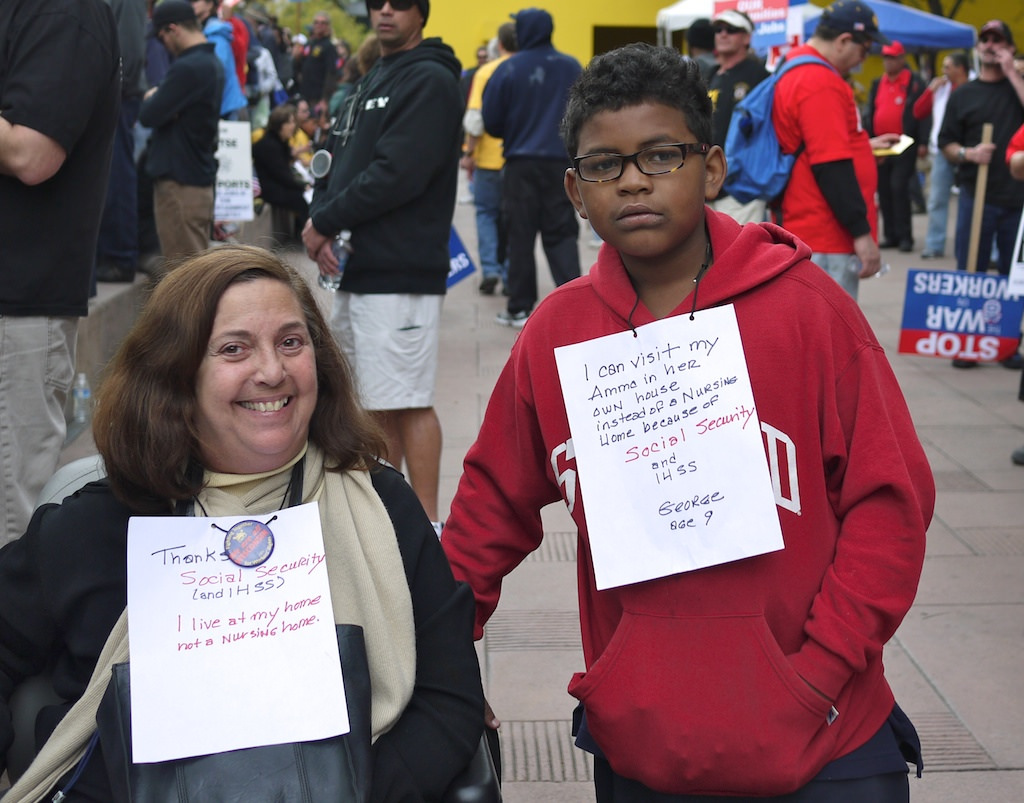The disability community has been waiting with grave concern for Trump’s ambitious budget proposal, fearing heavy cuts to the services they rely on despite his campaign promise to leave key entitlement programs alone. It turns out their concerns were well-founded — and now, disabled Americans are hoping Congress won’t act on his directive to gut Medicaid and Social Security Disability Insurance, key programs for the millions of Americans who live with disabilities.
According to latest Census data, 20 percent of Americans identify with some version of disability, and some have complex conditions that require extensive care, including medications and therapy, durable medical equipment, full-time aides to help them with tasks of daily living, and other supports. The poverty rate for disabled people is over double that of the nondisabled community, highlighting the fact that without essential benefits from the government, disabled people would not be able to afford their care.
The one-two punch of the budget and the American Health Care Act could make it functionally impossible for millions of disabled Americans to access health care, a recipe for almost certain death. In Britain, sharp austerity cuts in 2011 triggered thousands of deaths among disabled people who were deemed “fit to work” and cut off from their essential benefits, illustrating that concerns about dying from lack of care aren’t hyperbole on the part of disabled people in the U.S.
With limited representation in Congress, disabled people are counting on their elected officials to represent their needs, but they’re not optimistic, given Republican control of government and the GOP’s poor record on disability rights and entitlement programs. With a mandate from on high to cut spending, disabled people worry they may be viewed as expendable, with their deaths dismissed as inevitable attrition that’s considered acceptable in the name of the greater good — downsizing the government and controlling the deficit.
Despite the pervasive role of disability in society, disabled people often find themselves erased from policy conversations, and the general public is often unaware of the community’s needs and concerns. Over recent decades, disabled people have fought to protect community-based living, arguing that it’s difficult to contribute to society when they’re locked in institutions and sheltered workshops. They’ve also pushed for more equitable disability benefits, arguing that the structure of government programs can inadvertently enforce inequality — for example, in many states, disabled people lose key benefits if they work, which forces them into unemployment and poverty. Programs like Medical Assistance for Workers with Disabilities are designed to mitigate this problem, but they’re not universal, and they’re not always sufficient.
Nondisabled Americans may not fully understand what’s at stake for the disability community — which includes their friends and family members — and the deliberate obfuscation of many areas of the budget is compounding the issue. Media reports that the budget leaves Social Security “untouched,” for example, ignore SSDI, and given the high poverty rate in the disability community, Medicaid cuts are likely to hit disabled people hardest. They’re among those most likely to need the program to cover their health care expenses, yet they’re not part of the conversation on the future of Medicaid.
In March, disability justice protesters from ADAPT, a venerable disability rights organization, descended upon the Capitol rotunda to demand protections for Medicaid, in an action that led to nearly 50 arrests. The organization has led actions in and around D.C. for decades, fighting to bring disability issues into the light — yet, despite their calls of “nothing about us without us,” the disability community isn’t being treated as a stakeholder in the overall conversation about health care reform and changes to entitlement benefits.
Most disabled Americans would welcome a conversation about reforms to the outdated, labyrinthine, confusing, and sometimes superfluous systems intended to provide access to health care in America. These are services that can and should be delivered more efficiently, and should be offered in a way that empowers disabled people to take control of their lives and care. Fighting for piecemeal benefits and facing sometimes utterly arbitrary coverage decisions eats up valuable time and resources for disabled people and the government alike.
In the short term, the budget is not an appropriate venue for advancing reform to entitlement programs — simply slashing funding isn’t going to resolve the deep-seated problems that lead to issues like inefficiency and waste. If Trump and the GOP are truly concerned about the quality of health care in America, and how these services are delivered, they should be committed to serious reform that weighs human dignity, fiscal conservatism, and civil rights, three subjects that align more closely than many conservatives seem to realize.
Evidence suggests, for example, that universal single-payer health care may be cheaper and more effective to administer than the current hodge-podge of government programs designed to extend health care services. Research also indicates that community-based care is less expensive than institutionalization. It is possible to cut waste, promote human dignity, and apply evidence-based medicine to the health care challenges America is facing and will continue to face in growing numbers as the Boomers age and require more complex, intensive care.
Ultimately, it’s up to Congress to decide whether it values the lives of disabled Americans enough to include them in the appropriations bill that may decide the future of social services in America. Cutting through the safety net is the wrong thing to do, and if Congress commits to these devastating cuts, it could change the landscape for disabled Americans forever — because cutting funding doesn’t erase the need for these social supports, it just exacerbates them with a degree of cruelty that feels almost calculated.
Photo: Paul Bailey/Creative Commons

